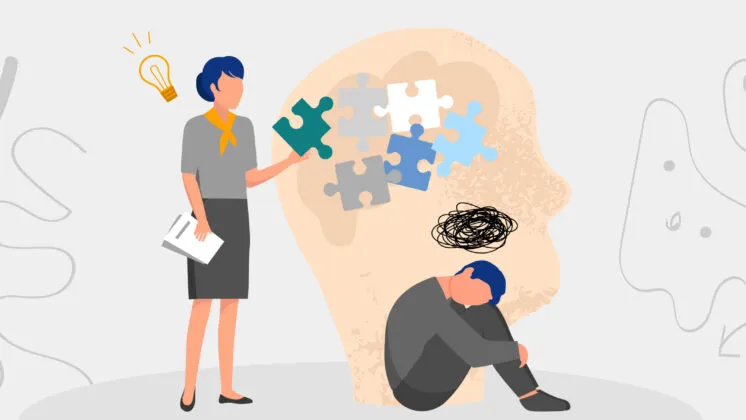Attention Deficit Hyperactivity Disorder (ADHD) is a neurodevelopmental condition with significant impacts on life, especially employment. It’s vital to know your rights if you deal with ADHD in the workforce.
ADHD isn’t just for kids; adults face it too. Its symptoms can meddle with focus, organisation, and self-control. This makes work life tough, reducing productivity and job satisfaction, and straining relationships at work.
Australia has laws preventing discrimination against ADHD sufferers. Employers must adjust to meet the unique needs of such employees. Recognised as a disability, ADHD requires special consideration in the workplace.
We’ll dig into how ADHD can affect your job and the laws protecting you in Australia. Discover tips on managing ADHD at work, its treatments, and legal rights. This insight aims to help you succeed in your career, despite ADHD challenges.
Whether ADHD is a new diagnosis or a long-known challenge, knowing your work rights is key to job satisfaction. Join us to explore ADHD’s role in employment and learn how to navigate these challenges successfully.

Understanding ADHD: Symptoms, Causes, and Diagnosis
ADHD is a neurodevelopmental disorder impacting both kids and grown-ups. It shows up as an ongoing mix of inattention, hyperactivity, and impulsivity, affecting day-to-day life and well-being.
ADHD Symptoms
The signs of ADHD are diverse and can range from mild to severe. Inattention might mean struggling to focus, getting easily sidetracked, and being forgetful. Hyperactivity shows as not being able to sit still, constant movement, and squirming.
Impulsivity symptoms include hasty actions, talking over others, and impatience. Despite these challenges, individuals with ADHD can bring unique strengths like innovation, vitality, and a flair for unconventional thinking.
ADHD Causes
The precise origins of ADHD are complex and not fully known. Yet, it’s believed that a mix of genetic, environmental, and neurological elements contribute. Genetics heighten the risk, making relatives of those with ADHD more prone to the condition.
External influences, like toxic exposure in utero, preterm birth, low weight at birth, and maternal substance use, can elevate the likelihood too. Brain irregularities, specifically areas governing attention and executive function, play a part in ADHD’s development as well.
ADHD Diagnosis
Identifying ADHD calls for a detailed assessment by a qualified specialist, often a psychologist or psychiatrist. It involves collecting data on the individual’s symptoms, health history, and input from educators, parents, or carers.
The DSM-5 guidelines serve as a key reference for diagnosis. They assess symptom type and intensity, how long they’ve been present, their impact on life, and exclude other explanations for these signs.
Getting the right diagnosis for ADHD is essential for proper management and support. It underscores the need for professional intervention right from the start.
Next, we’ll explore the diverse strategies for managing ADHD, which includes both pharmaceutical and non-pharmaceutical options.

ADHD Treatment Options and Medication
Managing ADHD involves a comprehensive approach fitted to each person’s needs. This approach aims to reduce symptoms and enhance daily function. Doing so allows for a better quality of life and the achievement of personal goals.
1. Medication
Medication plays a vital role in treating ADHD for many. It works by balancing brain chemicals, boosting focus, attention, and control over impulses. Stimulant medications, like Ritalin and Adderall, are often first choices due to their known effectiveness.
For those unable to take stimulants, or with specific health reasons not to, non-stimulant options, such as Strattera, might be recommended instead.
2. Psychoeducation and Counseling
Psychoeducation and counselling are key in handling ADHD. They enhance understanding, offering coping strategies, organisational improvement, and a boost to self-esteem. Cognitive-behavioural therapy is often advised to help with coping, problem-solving, and emotional regulation.
3. Behavioral Therapy
Behavioral therapy targets behaviours linked to ADHD, aiming to change them. It includes creating schedules, applying behaviour techniques, and encouraging positive actions. For parents, training programs can equip them with the tools needed to support their child at home.
4. School-based Interventions
For children and teens, school-based help is crucial. This support might include individualised education plans (IEPs) or 504 plans, as well as special accommodations. These are designed to ensure students can succeed academically and tackle their ADHD challenges.
5. Lifestyle Modifications
Enacting changes in lifestyle is significant in managing ADHD. Areas to focus on include sleep, diet, exercise, and cultivating an organised living and work space. These steps can significantly improve symptoms and overall functioning.
- Ensure you get enough sleep each night.
- Follow a healthy and balanced diet.
- Incorporate regular exercise into your routine.
- Create a structured and organized environment.
- Use visual reminders and calendars to help with organization.
Treating ADHD isn’t the same for everyone. Seeing a healthcare provider is essential. This ensures a full evaluation and the development of a treatment plan that best fits your needs. By working together, suitable approaches for managing ADHD can be explored and decided upon.
Navigating the Workplace with ADHD
Managing work with ADHD can certainly be challenging. Yet, with proper strategies, one can learn to cope effectively, thereby thriving in the professional realm.
Understanding ADHD’s Impact on Work
ADHD’s effects on work performance are varied. Those with ADHD might find it hard to organise, manage time, keep focus, or resist impulsive actions. These challenges can notably reduce one’s productivity. Moreover, forgetfulness and struggles with details may lead to missed deadlines and inaccuracies in project completion.
Strategies for Managing ADHD at Work
- Create a structured work environment: Choose to follow routines, utilise calendars and alerts, and prioritise tasks. This step will aid in maintaining both organisation and focus.
- Break tasks into smaller steps: Dividing lengthy projects into smaller, doable parts can decrease the project’s overwhelming nature and heighten productivity.
- Minimise distractions: To focus better, consider reducing distractions around your working area, like through the use of noise-canceling headphones or by relocating to a quiet spot.
- Implement time management techniques: Employ tactics such as timers, specific task time blocks, and the use of apps to keep attention sharp and enhance time management.
- Communicate with your colleagues: Inform your coworkers about your ADHD and how you’re working to manage it. Open dialogue can promote a supportive environment.
- Seek support when needed: Don’t hesitate to reach out for help should challenges persist. Support from healthcare professionals, therapists, or ADHD-specialised career coaches can provide valuable coping strategies.
Utilising the above strategies and seeking the right support, one can effectively navigate the work setting, leveraging personal strengths. This approach ensures a promising journey in the professional arena, despite the complexities ADHD might pose.
Employment Rights for Individuals with ADHD in Australia
Individuals with ADHD in Australia are granted specific rights in the workplace. Their rights ensure fair treatment and equal opportunities.
Employment rights are safeguarded by anti-discrimination laws, preventing disability-based unfair treatment. ADHD is lawfully recognised as a disability in Australia. Employers must make suitable adjustments for employees with ADHD.
Anti-Discrimination Legislation
Legislation in Australia shields those with ADHD from workplace discrimination. Employers cannot unfairly treat individuals during hiring, training, promotions, or in other job aspects.
Employers must make reasonable adjustments to assist employees with ADHD. These may include flexible work hours, extra training, or physical workspace changes.
Understanding Your Employment Rights
It’s crucial for those with ADHD to know their rights. If facing discrimination or a lack of support in the workplace, lodging a complaint is an option. Seeking legal counsel is recommended.
Employment law professionals can help you understand your rights. They offer advice and navigate legal challenges if needed.
Empowering Individuals with ADHD
Understanding workplace rights empowers those with ADHD to fight for fairness. Familiarising yourself with Australian law ensures you can address discrimination effectively.
- Stay informed about your rights and the legislation that safeguards individuals with ADHD in the workplace.
- Document any incidents of discrimination or the need for reasonable adjustments, keeping a record of relevant dates, individuals involved, and any supporting evidence.
- Seek support from advocacy organisations or support groups that specialise in ADHD and employment rights. These resources can provide guidance and assistance with understanding and asserting your rights.
- Consider seeking legal advice if you believe your rights have been violated or if you require assistance in resolving a workplace dispute related to your ADHD.
Remember, you have the right to a fulfilling and successful career, free from discrimination. Understanding your employment rights is the first step towards achieving workplace fairness and inclusivity for individuals with ADHD in Australia.

Workplace Protections and Support for Individuals with ADHD
In the working world, specific protections and supports are in place for those with ADHD. These are vital for individuals to excel in their jobs. The aim is to provide equal opportunities and the necessary adjustments for people with ADHD. This helps them unlock their potential.
Workplace Accommodations
Providing reasonable accommodations is a critical protection for individuals with ADHD at work. Such support can involve altering the workspace or job procedures. These changes are aimed at lessening the impact of ADHD symptoms on work. For instance, workplace adjustments may include:
- Flexibility in work hours for breaks or appointments
- Using written task instructions and reminders
- Utilising tools like noise-cancelling headphones or apps for better focus
- Pairing with a mentor to tackle work difficulties
Mentoring Programs
Being part of a mentoring program can significantly help those with ADHD in their professional journey. It connects them with seasoned employees who offer customised advice and support. Mentors focus on improving time management, finding strategies to maintain focus, and creating a space to address work challenges.
Employee Assistance Programs
Employee Assistance Programs (EAPs) also play a key role in supporting individuals with ADHD at work. These programs offer confidential therapy, mental health guidance, and access to professionals who understand ADHD. They are designed to assist in effectively managing the condition at work.
In essence, these protections and support systems greatly benefit individuals with ADHD, ensuring they can flourish in their careers. By providing specialised accommodations, mentoring, and access to EAPs, workplaces can be more inclusive and supportive. Thus, making it possible for those with ADHD to achieve success and satisfaction in their professional lives.
Resources for Individuals with ADHD in the Workplace
If you have ADHD and work, you can find support to tackle job challenges. These support areas include:
1. Support Groups
Being part of a support group for those with ADHD can foster a sense of belonging and mutual understanding. Members get a safe place to swap experiences, share strategies, and seek advice from those facing similar issues at work.
2. Advocacy Organisations
Groups focused on supporting those with ADHD offer crucial help. They aim to increase public knowledge, foster understanding, and champion employee rights in the workplace.
3. Online Tools and Apps
Various online resources and apps exist to boost the efficiency and organisational skills of those with ADHD at work. They aid in managing time, prioritising tasks, and setting achievable goals. This can help you maintain focus and meet deadlines.
4. Workplace Accommodations
Employers often must provide support for employees with ADHD. These can include flexible schedules, quiet work places, or tech tools. It’s key to talk to your employer and HR to find what’s possible.
5. Mentoring Programs
Having a mentor can make a big difference for those with ADHD. They offer advice and support, based on their own work experiences. These insights and strategies can be invaluable for managing ADHD impacts on work.
6. Employee Assistance Programs (EAP)
Employee Assistance Programs are private services offered by many companies. They can include counselling, specialist referrals, and help with work issues, ADHD included.
These resources are essential for anyone with ADHD at work. They offer support, advice, and practical aid, helping you improve productivity and well-being. With these tools, you can lower stress levels and succeed in your career.

